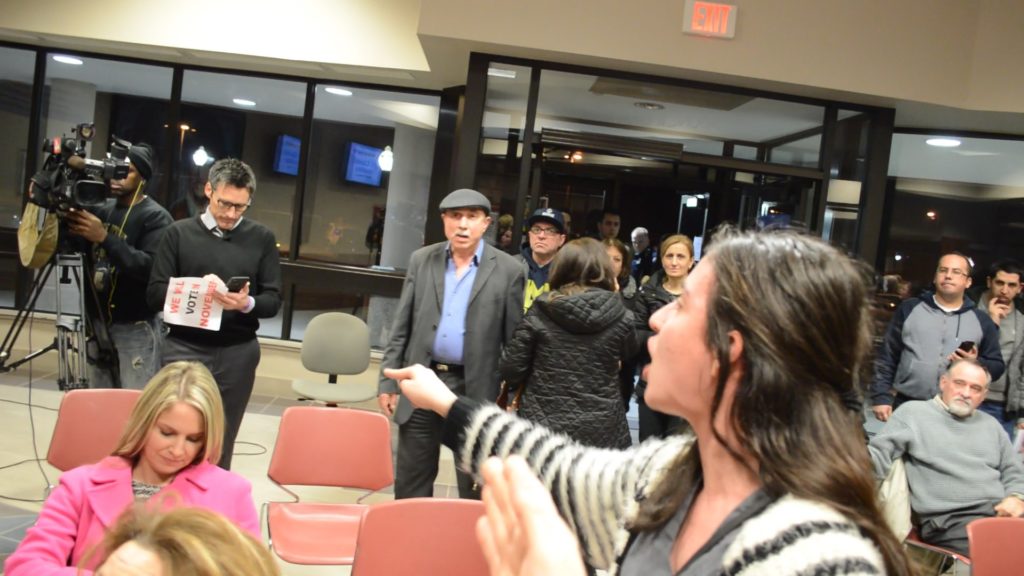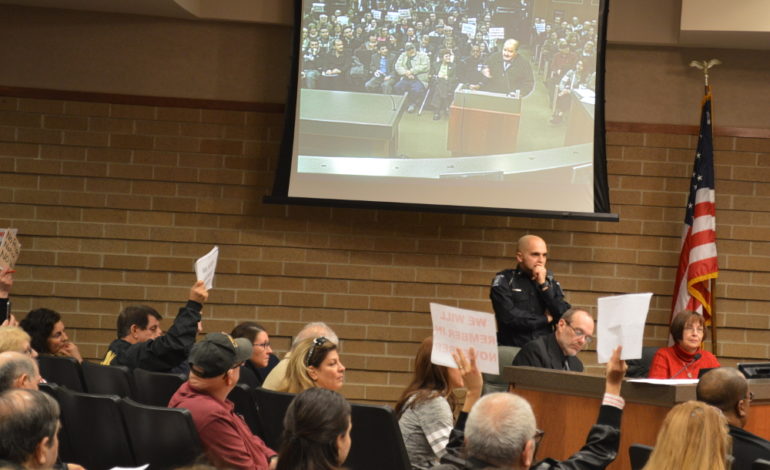STERLING HEIGHTS — Tempers flared to such a degree at the City Council meeting Feb. 21 that the mayor ordered the chamber cleared and an impassioned mob burst through the doors, shouting “This is just a show” and “they will be so sorry.”
Residents and others were forced to watch the remainder of the meeting, in which council members opted to settle a lawsuit involving a mosque, on closed-circuit TV in another room.
The settlement ends a legal battle between Sterling Heights and a Muslim group that filed to build a community center in the city. It came amid widespread resistance from residents, many of whom attended the meeting.
The Department of Justice (DOJ) filed the lawsuit in December after the Sterling Heights Planning Commission denied the construction of a mosque by the American Islamic Community Center (AICC) in Sept. 2015. The group first sued the city last August. The suits cited the Religious Land Use and Institutionalized Persons Act (RLUIPA), which protects individuals, houses of worship and other religious institutions from discrimination in zoning and land-marking law.
The Planning Commission asserted that the AICC’s project proposal did not meet the city’s code and zoning requirements, but the Muslim organization alleged that city officials intentionally infringed on the Constitutional rights of the group and its own residents. U.S. Attorney Barbara McQuade praised the settlement on Wednesday morning.
“I grew up in Sterling Heights and I am very proud to announce this settlement,” McQuade said. “Inclusion cannot mean that some groups are welcome and others are not.”
The settlement entails that Sterling Heights compensate the AICC with $350,000 toward the city’s insurance deductible and an additional undisclosed amount, among other remedies.
Construction on the site could begin this summer.

Controversy
The proposal generated controversy among residents, many of whom vehemently protested the mosque. They and the city claimed the construction permit was denied because of “the overall size of the project, a lack of parking and the project’s incompatibility with adjoining properties.”
They cited parking, traffic congestion and the size of the mosque’s dome and spires.
However, city officials’ emails and social media posts at the time painted a contrasting picture.
Email records show that Sterling Heights officials privately questioned if AICC leadership had ties to terrorism.
One email to Mayor Michael Taylor and then-City Planner Donald Mende urged the city to check if the mosque’s developers were on the terrorist watch list and Mende followed through with the then-police chief.
Mayor Taylor then objected to the mosque in the name of protecting the Chaldean community, writing on his Facebook profile, “I have nothing to do with the mosque and don’t want it built there.”
Taylor later retracted his position.
In Sept. 2015, Michael Shallal, an employee of a Department of Homeland Security contractor, lauded Taylor for his opposition to the mosque. “I just wanted to congratulate and commend your effort, and sound decision blocking the building of a mosque on 15 Mile Rd., which could have affected residents of your city 😉 on many levels,” Shallal wrote in an email to Taylor.
Anti-Muslim social media posts by Planning Commissioner Jeffrey I. Norgrove, who voted against the Muslim house of worship, showed he shared said officials’ sentiments.
The post suggests that Arab-owned small businesses in the city finance terrorism.
He also shared a photo of a pig with bold text that reads, “Share this pig if your (sic) not celebrating Ramadan.”
The mosque controversy stirred tensions and animosity between Arab American Muslims and Chaldeans.
At the day of the final Planning Commission hearing, pro-Mosque protesters reported being spat on and roughed up by Chaldean demonstrators.
“Religious war”
After contentious efforts to reach a compromise on the building’s technicalities, the attorney representing the city presented a resolution to settle with the DOJ at the Feb. 21 meeting, saying fighting it would burden residents with costs and that the community center would be erected, regardless.
Most of the standing room only crowd opposed settling the lawsuit and allowing the mosque to be built.
They were outspoken in their opinions before the Council, but made a concerted effort not to speak to the press.
Many in the city’s large Iraqi Christian population attended the meeting.
They described Sterling Heights as a safe haven from religious persecution in their homeland, yet fiercely stood against the project.
They insisted it was out of concern the mosque would increase traffic accidents and noise in their neighborhood – or because they did not wish for a Muslim center to be there.
However, some comments revealed more muddled reasons.
One resident said he resided near a mosque for 22 years while living in Iraq. “A month out of every year is a month called Ashura, where people march on the streets and hit themselves with chains and sharp objects,” he said. “During that month, whole traffic for the street has to be completely halted. I don’t know if the impact on that intersection was discussed.”
Another resident was also worried about traffic in the area.
“We run from back home from all the problems, that’s why we don’t want them to build the mosque,” she pleaded. “We need to be safe. The area is too crowded and too busy. It’s going to be too much friction… Please, we just wanna live in peace.”
A homeowner who’s lived in the neighborhood near the project for 40 years said he’s seen about 10 houses put up for sale.
“If this gets accepted, you are going to see a mass exit out of that neighborhood,” he said.
“I’ll tell you right now, I’m thinking of moving.”
Some residents also addressed the rumors of terrorist connections.
Before the session was called into a recess, one resident shouted “They are terrorist affiliated and financed.”
Former Troy Mayor Janice Daniels berated Mayor Taylor for spending money on a playground while being unable to fight a lawsuit and an ideology whose goals are “death to America.”
“The American Constitution is clear about freedom of religion,” said another resident before another recess was called. “What about the religion that wants to destroy the same American Constitution? You work with these terrorists, you are one of them!”
In actual fact, The First Amendment reads, in part, “Congress shall make no law respecting an establishment of religion, or prohibiting the free exercise thereof.”
During the hours of deliberations, Councilman Doug Skrzyniarz committed to leading an inclusive city and approved the resolution to settle, arguing the land-use issues were solved and further litigation would not financially make sense.
“This is not the first time something like this has happened in the history of the United States of America…this is the history of humanity,” he said. “Religious war is the first war we ever had in society.”
Mayor Taylor added that the AICC had met the seven of the planning commission’s criteria and that noise was never an issue. However, he “vehemently” denied that the commission discriminated against the Islamic center.
“I stand by that until the day I die,” he said.
But then Taylor asserted the Islamic center’s members were part of the community’s fabric and that settling was the right thing to do, because to “allow the AICC to have a place to worship is the American thing to do.”
His remarks caused the uproar that led to the forced exodus from the chamber.
The council’s decision was reflected in the resentful tears and bombastic expressions of attendees watching on the screens in the lobby.
“Shameful display”
Later, as displeased community members congregated outside the building, one resident preached his repulsiveness about Islam’s prophet.
Another resident, Nahren Anweya, implored the Muslim community that the Chaldean community is hospitable and welcoming, but held reservations about having a Shi’a mosque in a city with so many Iraqi Christians.
“The fact of the matter is what we suffered in Iraq and what we continue to suffer to this day is detrimental to our community,” she told The AANews.
“We came here to find a safe haven,” she added. “These people are traumatized by a genocide, and they are looking at it as ‘it is following us here and we have no home.'”
Moe Abdrabboh, the AICC’s attorney, and Muslim activists see the settlement as a victory and a step toward the protection of civil liberties, but are skeptical about the reasons behind the residents’ anti-Muslim sentiments. Dawud Walid, executive director of the Council on Islamic Relations’ Michigan chapter (CAIR-MI), wrote in a statement that what he watched was a “shameful display” of a long-time overt bigotry in that community.
He pointed out the irony and misinformation that fueled the contention, stating that most Chaldean community members are fourth-generation Americans who have few ties to Iraq, and that most of ISIS’ victims are Shi’a or practice normative Sunni Islam.
Abdrabboh told The AANews he does not believe the Planning Commission cared so much about zoning protocols, but that they were used to mitigate the Islamophobic comments some city officials had made.
He welcomed the passing of the resolution and expressed hope for fresh beginnings with the city, but said that it was 18 months too late, as the opposition has set a tone that Muslims are unwelcome in the community and that the mayor – a seasoned lawyer and politician – was attempting to please both sides.
“There were too many city officials who preached integration, but practiced segregation,” Abdrabboh said.
He added that a PR campaign will not work to promote understanding between other communities and Muslims and pointed to the solidarity portrayed at airports nationwide following the signing of the executive order that banned travel from seven Muslim-majority nations.
Still, he said the sentiments revealed at the City Council meeting is worrying and he urged the city to bolster protection at the mosque.
The poorest are those who live in ignorance, Abdrabboh said.
“The City of Sterling Heights has a lot of people living in complete and utter darkness.”






2 Comments
David
March 4, 2017 at 5:46 pmIslam does not get a special place in America! And when anyone criticises a religion in America that is also a constituional right!
Sterling Heights settles mosque lawsuit amid residents’ outcries – arabamericannews.com | ARAB NEWS
March 5, 2017 at 11:24 am[…] Source : https://www.arabamericannews.com/2017/02/27/sterling-heights-settles-mosque-lawsuit-amid-residents-ou… […]